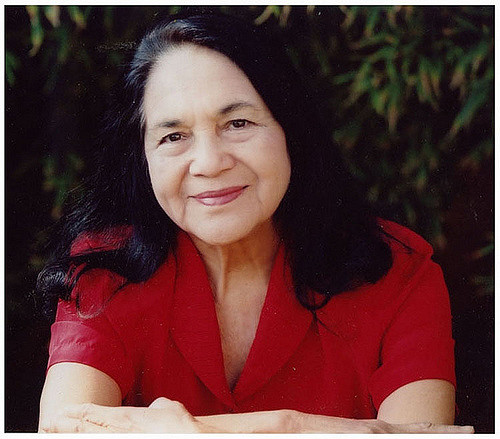
Alexandra Thurber
Out of the 1960s emerged a social movement focused on developing a progressive social climate in which racial equality was achieved and labor justice was served. This campaign’s success was completely dependent on invigorated supporters and their refusal to relent until this country recognized people’s grievances and began to rectify years of subjugation. So, exactly whose eyes did America have to look into when facing the consequences of oppression?
Among the most eminent campaigners of the Chicano Movement were Reies Lopez Tijerina, “Corky” Gonzales, Cesar Chavez, and his counterpart, Dolores Huerta. The last of these activists is an especially distinguished champion of racial equality, as she was the only female figure to hold office in the United Farm Workers (UFW) union, specifically as vice president.
Thanks to UCSB’s MultiCultural Center, students had the privilege of recapturing Huerta’s extraordinary narrative of self-sacrifice, humiliation, and historical triumph with a screening of the biopic Dolores on Jan. 17. A discussion led by Dr. Rebeca Mireles Rios of the Gervitz Graduate School of Education followed the screening.
Dolores dissects Huerta’s experiences confronting the convention of systematic oppression. The film centers on her 40 years of devotion to the UFW, beginning with her co-founding of the organization in 1962 to her 2002 resignation. The film stirs intense emotion with depictions of strife within the Chicano movement, such as the police beating Dolores was victim to in 1988.
This documentary effectively works to recover the honor of Chicano culture and appropriately commemorate Dolores Huerta by first exposing the audience to the preceding years of exploitation. In doing so, viewers became more receptive to the harshness of Dolores’s struggle as a Latina woman, hence solidifying our impression of her legacy. The audience was eager to review the theme of feminism within the context of “Dolores,” and this topic became the focal point of Dr. Rio’s post-film discussion.
Dr. Rios aspired to further engage the audience in cultivating a sense of pride and dignity for Latina women. Her questioning initiated dialogue between students and the unequal division of labor and credit between men and women. “Why are women compelled to choose between family and social justice?” Dr. Rios asked. Here is where the investigation of sexism within Chicano history began.
Crowd members questioned the disparity between the credit Huerta deserved and the credit she received. In reviewing the events of her life, it seems evident that the name Dolores Huerta should be synonymous with success. So why isn’t she a household name?
Dr. Rios placed blame on our public education system’s habit of perpetually erasing women from history. Many attendees gave their personal testimonies to prove the prevalence of this phenomenon. One particularly shocking illustration repeatedly voiced was the shared misconception that Cesar Chavez established the slogan “¡Sí se puede!” when in fact Dolores created it.
The conversation then shifted to the repercussions of unfair representation, both of minorities and women, within our society. While examining the impact of unbalanced representation, the audience concentrated on its direct effect on Chicano youth and concluded that not teaching children their ancestry initiates a lack of interest in the study of history.
Dr. Rios responded to this phenomena by advocating for ethnic studies. Those conscientious of America’s present climate of racial and gendered conflict found this sentiment especially pertinent and understood this to be the lesson of “Dolores” and Dr. Rio’s forum. After their experience at the MCC, students re-entered their educational spheres with a revived sense of pride and an urgency to promote change. After all, ¡Sí se puede!










